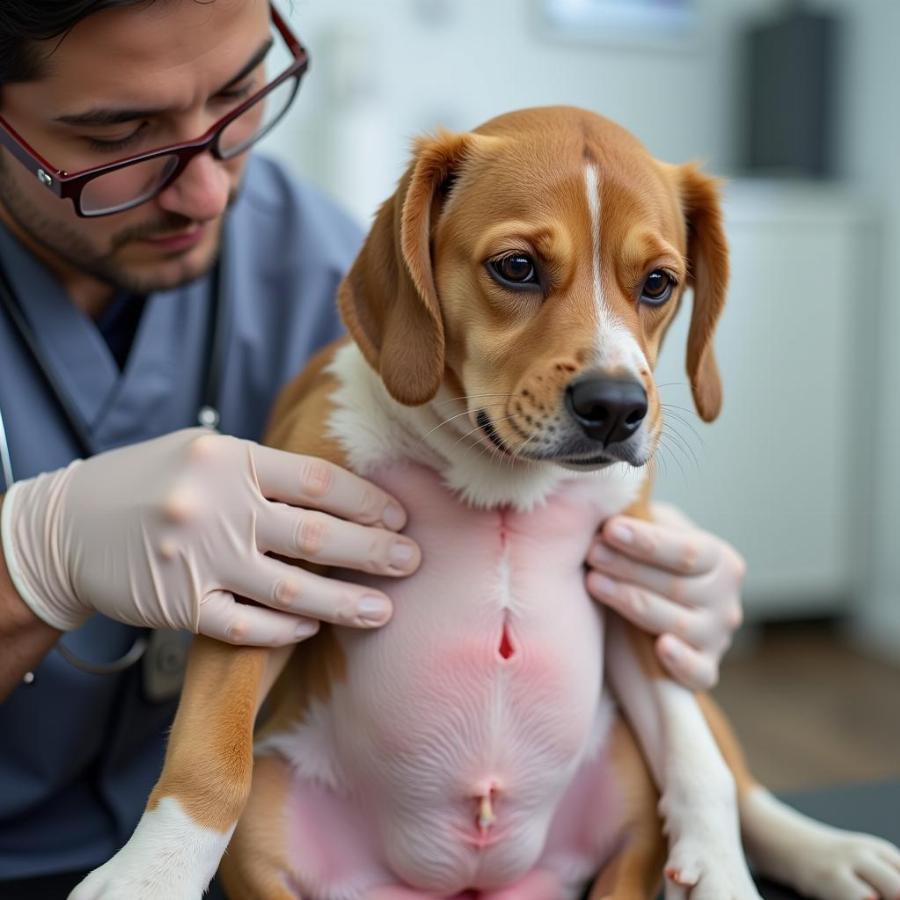A swollen penis in dogs, while sometimes alarming, can stem from various reasons, from minor irritations to more serious medical conditions. Understanding the potential causes of a dog’s willy swollen, also known as paraphimosis or priapism, is crucial for ensuring your furry friend receives the appropriate care. This article dives into the common causes, treatment options, and when it’s time to seek immediate veterinary attention.
Understanding Why a Dog’s Willy is Swollen
Several factors can contribute to a dog’s swollen willy. Sometimes, the swelling is a natural physiological response, while other times, it indicates an underlying health issue. It’s essential to observe your dog for any accompanying symptoms, such as licking the area excessively, discomfort, or difficulty urinating.
Common Causes of Swelling
- Priapism: This refers to a persistent and often painful erection that isn’t associated with sexual stimulation. Priapism can be caused by blood clotting disorders, nerve damage, or certain medications.
- Paraphimosis: This occurs when the foreskin of an unneutered male dog becomes retracted and cannot return to its normal position, constricting the penis and causing swelling. This is a medical emergency.
- Trauma or Injury: An injury to the penis, such as a bite or blunt force trauma, can lead to swelling.
- Infection: Bacterial or fungal infections can cause inflammation and swelling of the penis and surrounding tissues.
- Allergies: Allergic reactions to certain substances, such as pollen or cleaning products, can manifest as swelling in various parts of the body, including the penis.
- Insect Bites or Stings: Bites or stings from insects on or near the penis can cause localized swelling.
When to Seek Veterinary Care
If your dog’s willy is swollen, it’s always best to consult a veterinarian, especially if the swelling is accompanied by:
- Persistent erection (priapism)
- Inability to retract the foreskin (paraphimosis)
- Bleeding or discharge
- Difficulty urinating
- Lethargy or loss of appetite
- Excessive licking or biting of the area
What to Expect at the Vet
The veterinarian will perform a physical examination and may recommend additional tests, such as blood work or urine analysis, to determine the underlying cause of the swelling.
 Bác sĩ thú y đang khám chó
Bác sĩ thú y đang khám chó
Treatment Options for a Swollen Willy in Dogs
Treatment for a swollen willy will depend on the underlying cause. Options may include:
- Medications: Antibiotics for infections, anti-inflammatory drugs to reduce swelling, or medications to address underlying medical conditions.
- Manual Reduction: In cases of paraphimosis, the veterinarian may attempt to manually reposition the foreskin.
- Surgery: In severe cases of paraphimosis or other conditions, surgery may be necessary.
- Cold Compresses: Applying cold compresses to the area can help reduce swelling and discomfort.
Preventing Future Swelling
While not all causes of a swollen willy are preventable, some measures can help reduce the risk:
- Neutering: Neutering eliminates the risk of paraphimosis.
- Hygiene: Keeping the genital area clean can help prevent infections.
- Regular Veterinary Checkups: Routine checkups can help identify and address potential health issues early on.
Conclusion
A dog’s willy swollen can be a symptom of various conditions, some minor and others requiring immediate veterinary attention. Prompt diagnosis and treatment are essential to ensure your dog’s comfort and well-being. Don’t hesitate to contact your veterinarian if you notice any swelling or other abnormalities in your dog’s genital area.
FAQs
- Is a swollen willy always a sign of a serious problem? No, not always. Sometimes it can be due to a minor irritation. However, it’s always best to consult a veterinarian to rule out any underlying medical conditions.
- Can neutering prevent a swollen willy? Neutering can prevent paraphimosis, a condition where the foreskin cannot be retracted.
- What should I do if my dog’s willy is bleeding? Seek immediate veterinary attention.
- How can I clean my dog’s genital area? Use a warm, damp cloth and gently clean the area.
- Can allergies cause a swollen willy in dogs? Yes, allergic reactions can cause swelling in various parts of the body, including the penis.
- How long does it take for a swollen willy to go down? The recovery time depends on the underlying cause and the treatment prescribed by the veterinarian.
- What are the signs of an infection in a dog’s willy? Signs of infection may include redness, swelling, discharge, and discomfort.
Beaut Dogs is your trusted source for all things canine, offering expert advice and comprehensive resources for dog owners. We provide in-depth information on various dog breeds, their unique characteristics, and specific care requirements. Beaut Dogs also offers guidance on health, nutrition, training, and responsible pet ownership. From choosing the right breed to providing the best care, https://beautdogs.com is here to help you navigate the wonderful world of dog ownership. When needing assistance, don’t hesitate to reach out via Email: [email protected] for detailed and accurate support from Beaut Dogs.